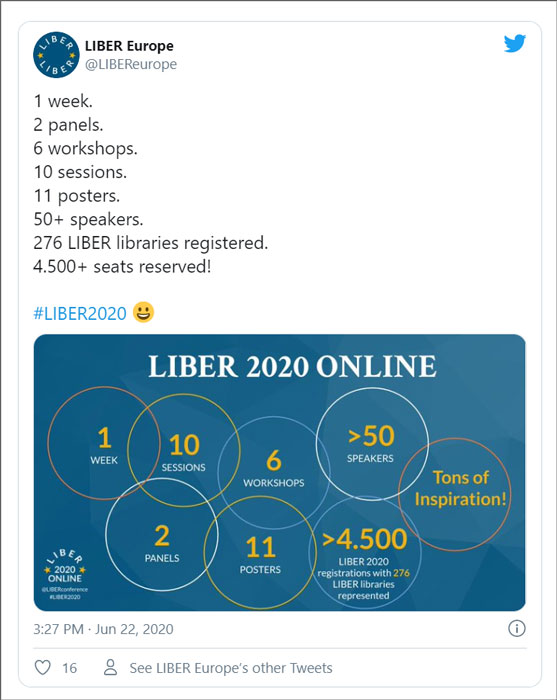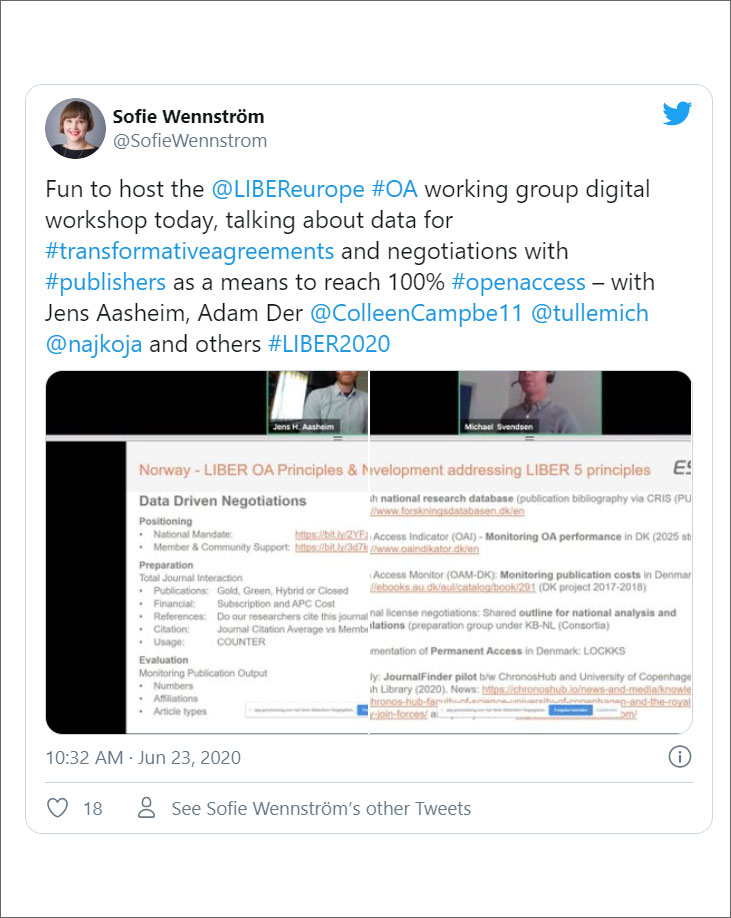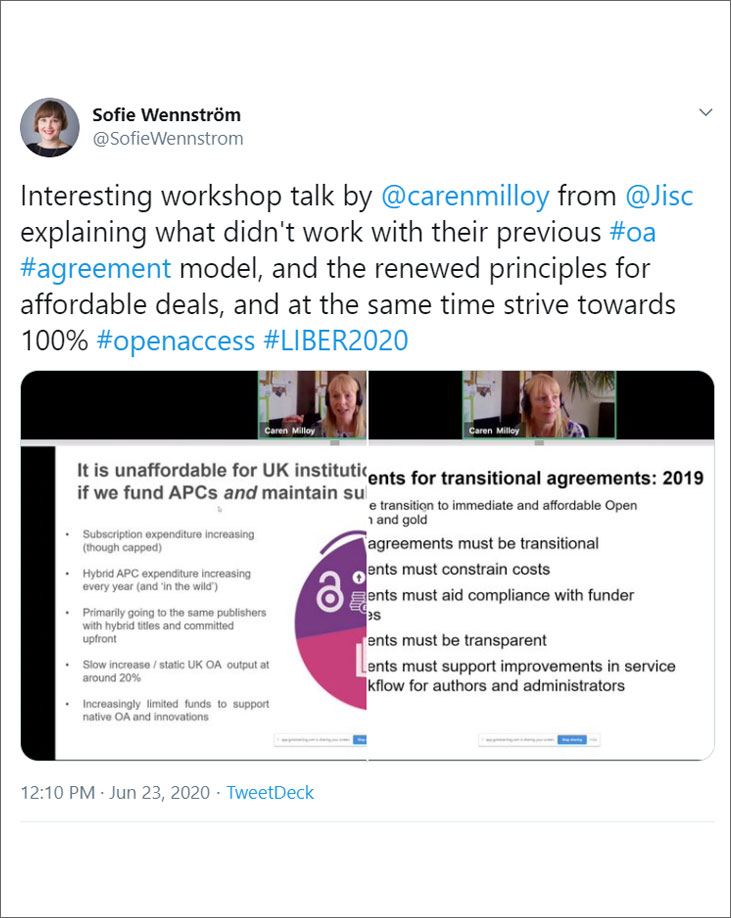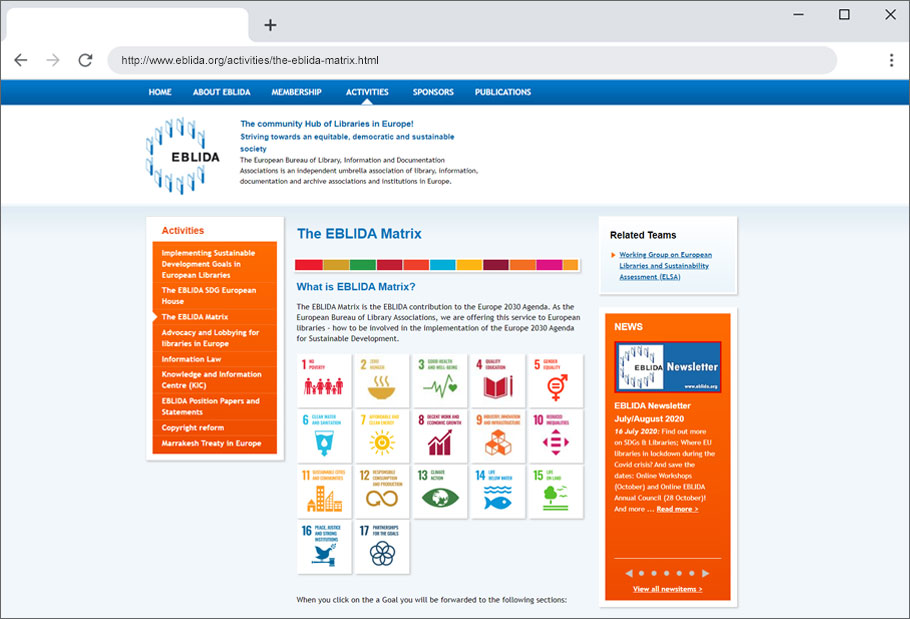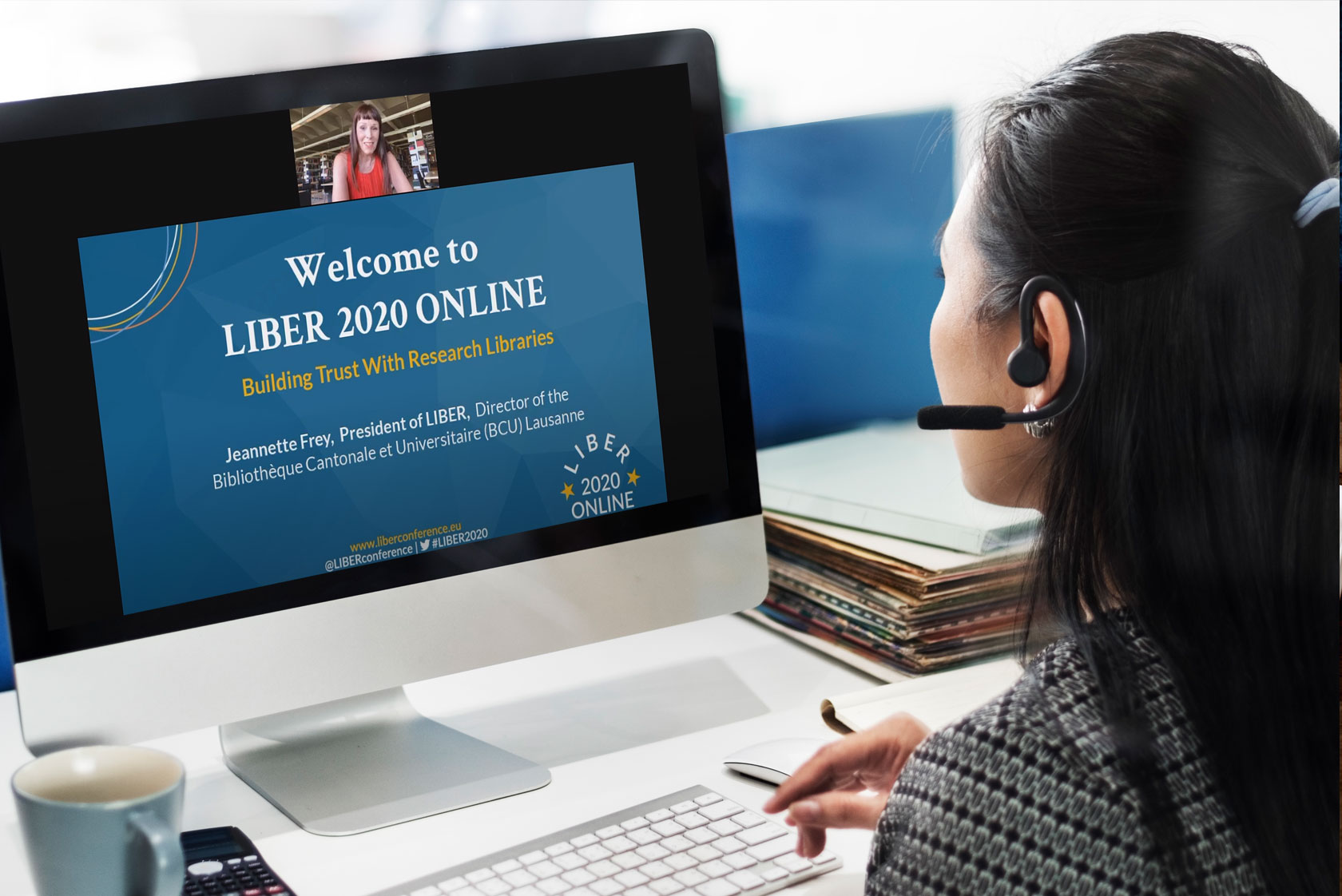
LIBER 2020 Online: Building Trust with Research Libraries
Many of the topics of the LIBER 2020 Online conference can be classified under the keyword "Open Science". A special focus was placed on "trust", which – just like transparency – is both an aspect and a goal of openness, and on Citizen Science. And above all, the question of what role these topics play in face of the corona pandemic was raised.
by Tamara Pianos, Guido Scherp, Olaf Siegert and Claudia Sittner
The Ligue des Bibliothèques Européennes de Recherche (LIBER) holds its annual conference every year in June. Due to the corona pandemic, the conference had to be transferred into a virtual format this year. In this article, we provide you with a brief review on some sessions and workshops of LIBER 2020 Online.
Despite the adversities, the organisers of the LIBER conference managed to set up a versatile online event. As a benefit of the online format: The conference was free to access for all participants. Therefore, more than 4,000 people registered for the event, making it the biggest LIBER conference ever so far.
The slogan for this year’s conference was „Building Trust With Research Libraries“ putting the focus on safeguarding trustworthy information in times of fake news and discussions about science, findings and facts. Here, research libraries can help students and researchers to find what they are looking for and to put that information into context. The topics of today’s research libraries range from Open Science and world-wide sharing of publications and data to the long-term preservation of collections. This diversity was reflected in the conference programme.
If you like you can jump to the topics of this blogpost
Reflections on the impact of COVID-19 on Open Science
The massive impact of the corona pandemic on the work of libraries was considered from various angles in the first session “Opening Address – Reflections on the impact of COVID-19 on Open Science”.
In the first talk Bertil F. Dorch (University of Southern Denmark (SDU)) took up the challenges of managing a library in these times. Using the SDU library as an example, he described very vividly the complete closure up to the (partial) reopening and how SDU accomplished the digital transition. He has drawn three lessons from this:
- Communicate internally to employees and externally to users. The main message communicated for example via the website and social media is: We are still here for you.
- Grab the opportunity: On the one hand make use of digital possibilities to provide local services. On the other hand, reconsider work-life balance in times of home office.
- Position your library as a trustworthy partner: Show that you are open and engaged, and that you can also go new ways after having explored the digital possibilities.
In the second lecture Birgit Schmidt (Göttingen State and University Library, Germany) gave a general overview of the effects of the corona pandemic on science. There is basically a push towards open science. Especially in medicine, the popularity of preprints and the sharing and reuse of research data has increased significantly. In this context, corresponding platforms for collaborative work are more frequently used. Because research data is essential here, guidelines and recommendations for handling COVID-19 research data have been developed by the Confederation of Open Access Repositories (COAR) or the Research Data Alliance (RDA), for example. In addition, science communication has gained more relevance. The public also has the opportunity to view the course of the pandemic via so-called dashboards, which are often open source and rely only on Open Data. On the other hand, the pandemic also caused restrictions on everyday research, for example because of closed laboratories or home office and schooling.
Finally, Giannis Tsakonas (LIBER) further deepened the aspect of the already mentioned push for openness in his talk. Publishers are making COVID-19-related publications available via Open Access that were previously behind paywalls. But in the end, many existing problems, such as the publishing system of today, remain unsolved. Therefore, it is important to use the crisis to establish sustainable conditions to further promote open practices and cultural change.
Transitioning Scholarly Journals to Open Access
The workshop „Transitioning Scholarly Journals to Open Access“ was organised by the LIBER Open Access Working Group in order to review LIBER’s Five Open Access Principles for Negotiations with Publishers.
Its aims were to understand, how the principles have been put into practice in preparing and negotiating successful transformative agreements and to gather input from workshop participants on how the principles might be updated.
Following a brief presentation from the Initiative Data Analytics Working Group of the „Efficiency and Standards for Article Charges“ (ESAC), participants and ESAC data analysts broke into small groups for a Q&A about the different sources of data and methods for analysis used in many of the transformative agreements negotiated to date.
In the second part of the workshop Caren Milloy (Jisc, UK) spoke about „Strengthening the UK’s requirements for negotiations“. She also explained what didn’t work with their previous Open Access agreement models and how Jisc renewed its principles for affordable deals in the UK.
After that, the LIBER principles and other similar guidelines on transformative agreements were reviewed.
Super-Charging Your RDM Impact
The session „Super-Charging Your RDM Impact“ focused on training programmes developed by LIBER institutions, teaching librarians and libraries to convey the necessary skills to establish successful Research Data Management (RDM).
In the first talk Christos Kontzinos (National Technical University of Athens, Greece) presented recommendations for research libraries to boost their research infrastructure impact, and to raise their research data services’ standards.
Then, Olaf Siegert (EconStor, ZBW – Leibniz Information Centre for Economics, Germany) introduced a data training programme. After identifying a gap between increasingly data-intensive work and a lack of training provided in this area, the programme was set up to train doctoral candidates in good practices in managing and documenting research data.
In the third talk Susanna Nykyri and Katja Fält (Tampere University Library, Finland) discussed responsible research data management collaborations in university libraries in Finland as well as open data learning requirements and opportunities. They presented joint solutions for research data management and open data support services.
Tools for Transparency and Open Access
Transparency plays a crucial role in fostering Open Access as it provides insight into processes and enables trust in library services. The three presentations in the session “Tools for Transparency and Open Access” highlighted developments in this area.
Sara Ames (National Library of Scotland (NLS)) presented the founding process of the Data Foundry. Identifying user needs was an important step in the actual creation of services. The Data Foundry was created with transparent access to data collections which are open and reusable. By also making the decision-making process open – for instance why specific material is being digitised – transparency is guaranteed. As the general public is a target group for the NLS everyone is supposed to be able to follow the process of data provision.
In the second talk, Maurits van der Graaf (Pleiade Management & Consultancy, Netherlands) introduced a library toolkit for Open Access. He showed that tools and library policies are an important factor in realising Open Access. In addition to agreements with big publishers mechanisms are needed to cover the long-tail of publishers. Extra staff in libraries is needed for these tasks and the library’s acquisition budget may become an article publishing budget in the transformation process. Van der Graaf stated that Open Access clearly provides big advantages for scholars like a higher visibility and more citations. Therefore, it can and should be promoted by libraries.
In the final presentation, Nicole Krüger and Tamara Pianos (EconBiz, ZBW, Germany) presented the EconBiz Academic Career Kit for researchers in their early careers. They described the challenges in creating and offering an interactive open educational resource (OER). The first step was to find a suitable non-proprietary platform. During the creation process other questions concerning CC-licensing and reusing other material arose. Making OER available to potential users was and still is challenging.
Citizen Science, sustainability and the role of libraries
The session “Citizen Science Supporting Sustainable Development Goals: The possible role of libraries” focused on how Citizen Science projects can help to achieve the 17 sustainable development goals (SDG) of the United Nations (UN) and what strategic role libraries can play as a key player in this context.
In the first presentation, Guiseppe Vitiello (European Bureau of Library, Information and Documentation Associations (EBLIDA)) presented his organisation and its work for the 17 SDG in European libraries. Vitiello sees the role of libraries as a bridge between science and citizens and emphasises that even small organisations like EBLIDA can make a difference in the field of the SDG.
In the second presentation, Tiberius Ignat (Scientific Knowledge Services) reported on the results of the “LIBER Citizen Science Working Group”. The group has achieved all its goals so far, including: a template on how research libraries can become the single point of contact, a webinar and a guide for libraries. Under the title “Citizen Science and the Third Mission” the working group summarises the main objectives of cooperation between science and society as follows:
- Researchers and the public should learn from each other,
- promote scientific competence in society,
- address the needs of society,
- establish autonomy for science,
- keep misinformation at bay, and
- enhance public-private research under liberal licensing.
In the last part of the session, Anne Kathrine Overgaard and Thomas Kaarsted (Citizen Science Network, (SDU), Denmark) showed how Citizen Science can work with three best practice cases on active living, climate lakes and the repair and recycling of electronic devices.

Jump to the video
Integrate video for the case “Bring your own device”
It is interesting to note that the Citizen Science Network is embedded in all faculties and in the library of SDU and always aims to get media partners on board who draw attention to the projects in articles and social media. For them, Citizen Science is basically about initiating projects that create interaction and dialogue between citizens and researchers. Only then the distance between them can be reduced in order to promote a debate based on knowledge and facts and thus activate “the power of many”.
Conclusion of the LIBER 2020 online conference
The virtual version of LIBER was as interesting and versatile as the joint event on site. Q&As were possible in the chat and reactions could be shown during the presentations via emoticons. What was missing was the personal exchange and networking opportunities. And of course, the presence of a person in the same room is completely different from the virtual one.
Among the advantages of the online conference were: Without travel expenses and conference fees many more people could participate online. Therefore, it can be assumed that people who usually might not have the possibility to attend such a conference also participated. Thereby the LIBER conference became more open itself. Due to this, the organisers should keep in mind to offer more opportunities for online participation for LIBER 2021.
Most of the presentations and videos from the talks are available via the LIBER website.
Dr Tamara Pianos studied Geography and English literature. After completing her doctorate in Canadian Studies and a traineeship as an academic librarian she worked at the TIB in Hanover. Since 2005, she has been working at the ZBW – Leibniz Information Centre for Economics, where she is now head of Information Provision and Access. She is the product manager of the EconBiz portal and is responsible for information literacy topics.
Dr Guido Scherp is Head of the “Open-Science-Transfer” department at the ZBW – Leibniz Information Centre for Economics and Coordinator of the Leibniz Research Alliance Open Science. He can also be found on LinkedIn and Twitter
Olaf Siegert is head of the Publication Services department and Open Access Representative of the ZBW – Leibniz Information Centre for Economics. He is involved with open access as part of his work at the ZBW and is also active for the Leibniz Association, where he represents the Leibniz Open Access working group in external committees. He is involved in the Alliance of Science Organisations in the working group Scientific Publication System and at Science Europe for the Leibniz Association.
Claudia Sittner studied journalism and languages in Hamburg and London. She was a long time lecturer at the ZBW publication Wirtschaftsdienst – a journal for economic policy, and is now the managing editor of the blog ZBW MediaTalk. She is also a freelance travel blogger (German), speaker and author. She can also be found on LinkedIn, Twitter and Xing.
Portrait: Claudia Sittner©
View Comments
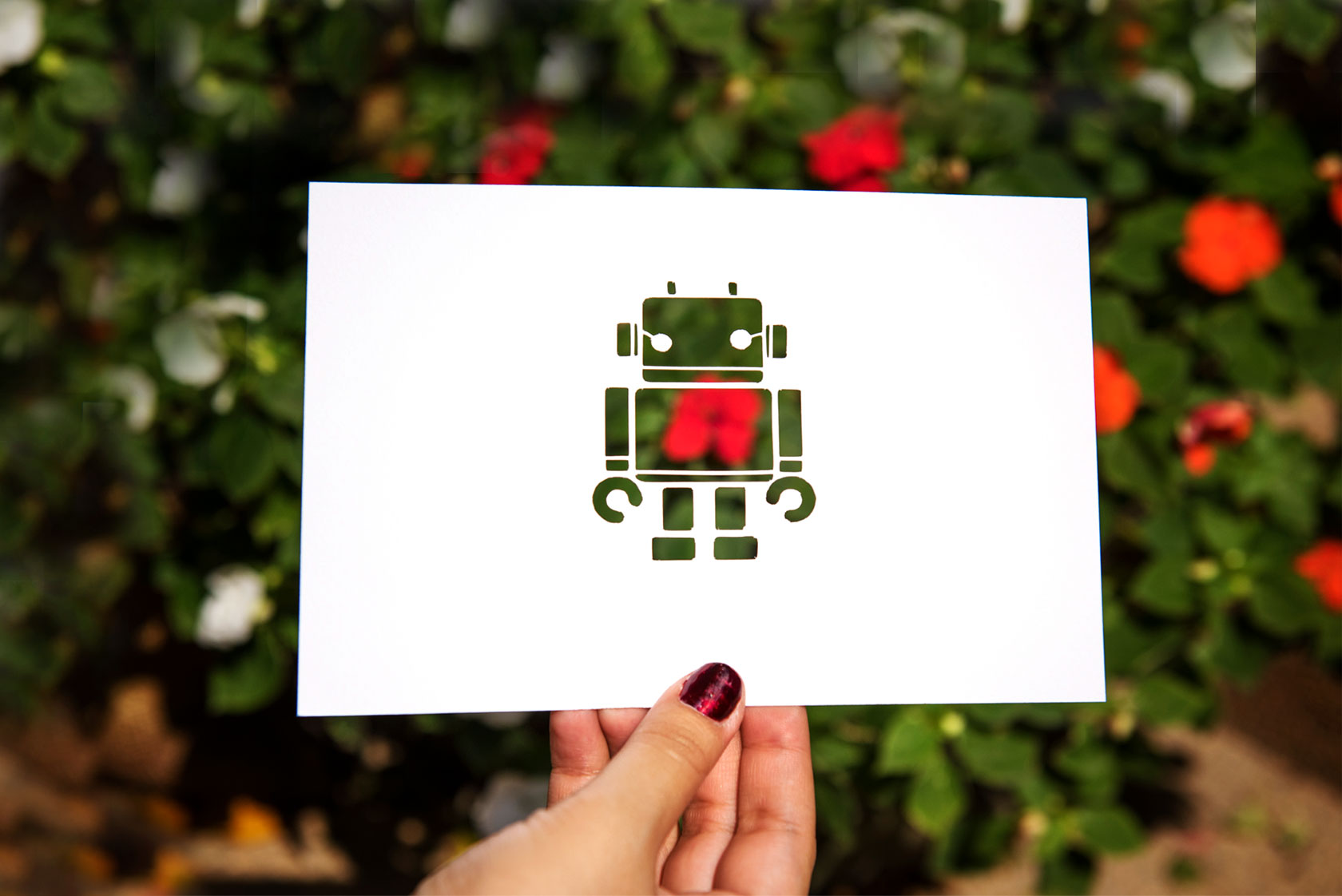
Hackathon Coding.Waterkant: How to Improve Library Services Through Chatbots and Artificial Intelligence
“Hackathons” have been around for several years now in the world of libraries. They...

